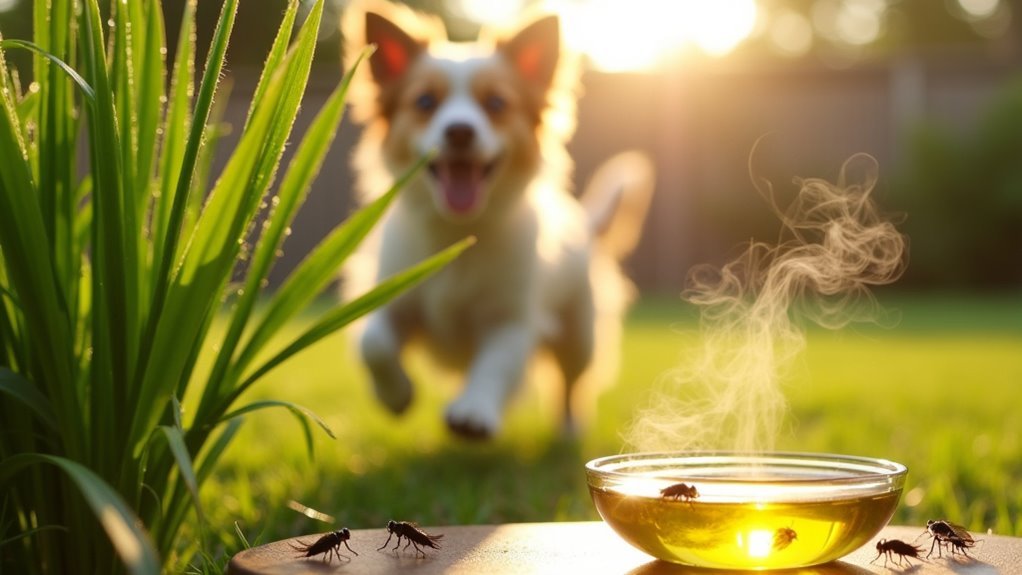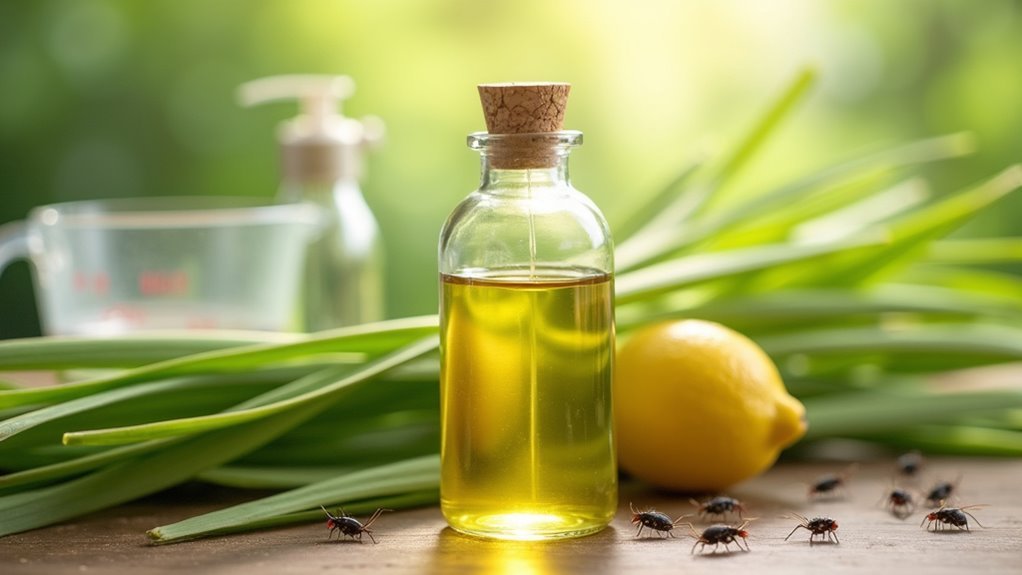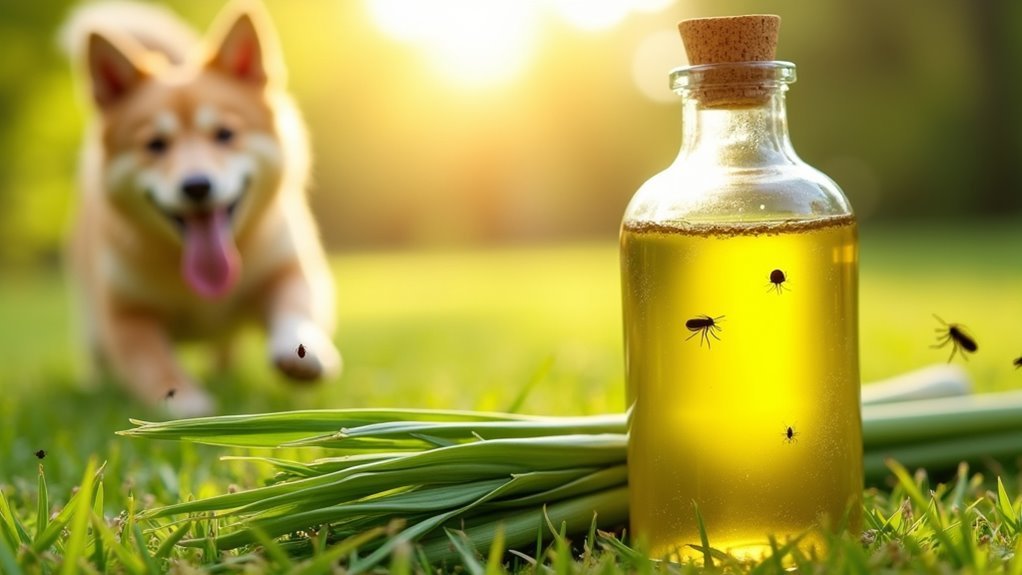Lemongrass oil repels fleas effectively because its active compounds citral and geraniol disrupt fleas’ olfactory receptors, preventing them from detecting your pet’s carbon dioxide and heat signals. This creates immediate disorientation and erratic movement patterns in fleas, while the oil’s neurotoxic properties can incapacitate or kill them on contact. The strong aroma also acts as a natural deterrent, interfering with fleas’ life cycle and navigation cues. Proper application techniques will maximize these protective benefits.
The Science Behind Lemongrass Oil’s Flea-Repelling Properties

Lemongrass oil’s potent flea-fighting abilities stem from two key compounds: citral and geraniol. These substances possess powerful insecticidal properties that disrupt fleas’ olfactory senses, making it nearly impossible for them to locate their hosts.
When you apply lemongrass oil, it creates neurotoxic effects that incapacitate or kill fleas on contact.
The oil’s strong aroma acts as a natural deterrent, keeping fleas away from your pets and living spaces. Research shows it effectively reduces flea populations by interfering with their life cycle, preventing feeding and reproduction.
When you use diluted forms properly, lemongrass oil provides a safe alternative to harsh chemical insecticides. This natural approach to flea control offers you an effective solution that repel fleas without compromising your family’s health or environmental safety.
How Lemongrass Oil Disrupts Flea Behavior and Navigation
Understanding how these compounds work reveals their sophisticated impact on flea behavior and navigation systems.
When you apply lemongrass oil, citral and geraniol target fleas’ olfactory receptors, disrupting their ability to detect carbon dioxide and heat signals from potential hosts. This interference causes immediate disorientation, making it nearly impossible for fleas to locate you or your pets effectively.
The oil’s insecticidal properties don’t just repel—they incapacitate fleas upon contact, causing erratic movement patterns.
You’ll notice fleas struggle to settle and feed, as the strong scent masks their natural navigation cues. Regular application creates an inhospitable environment for fleas, fundamentally altering their behavior patterns.
This multi-layered disruption makes lemongrass oil particularly effective, as it attacks multiple aspects of flea survival simultaneously.
Comparing Lemongrass Oil to Other Natural Flea Repellents

When evaluating natural flea repellents, you’ll find that lemongrass oil stands out for its unique combination of safety and effectiveness.
Unlike peppermint oil, which becomes harmful to pets in high concentrations, lemongrass oil remains safe when properly diluted. Its natural insecticidal properties disrupt flea olfactory senses more effectively than many essential oils.
Lemongrass oil disrupts flea senses effectively while maintaining pet safety through proper dilution, unlike potentially harmful peppermint oil.
You’ll notice lemongrass oil provides longer-lasting protection compared to lavender essential oil, extending your pest control coverage.
While citronella primarily targets mosquitoes, lemongrass oil works as an effective natural flea repellent that’s also effective against ticks, giving you broader protection.
Additionally, this essential oil offers a calming effect on dogs while it works to repel fleas—a dual benefit most other natural repellents can’t match.
Safe Application Methods for Lemongrass Oil Flea Control
Proper dilution protects your pets while maximizing lemongrass oil’s flea-fighting benefits. You’ll need to mix 15 drops of this essential oil with one tablespoon of carrier oil before applying it to pet bedding or your animal’s fur. This diluted mixture guarantees safe application while maintaining effective flea control.
| Application Method | Ratio | Usage |
|---|---|---|
| Topical Treatment | 15 drops per 1 tbsp carrier oil | Apply to pet bedding |
| Spray Solution | 15-20 drops per spray bottle | Target flea-prone areas |
| Bath Addition | 2 drops in pet shampoo | Weekly grooming |
These natural remedies require reapplication every few days for peak pest control. You must monitor pets closely for adverse reactions when introducing lemongrass treatments, discontinuing use if irritation occurs.
Maximizing Effectiveness With Proper Dilution and Usage Techniques

Although lemongrass oil shows promising flea-repelling properties, you’ll achieve the finest results by mastering specific dilution ratios and application timing.
Mastering proper dilution ratios and strategic application timing maximizes lemongrass oil’s natural flea-repelling effectiveness for optimal pest control results.
Proper dilution requires mixing 15 drops of Lemongrass Essential Oil with one tablespoon of carrier oil for safe pets care. This prevents adverse reactions while maintaining maximum effectiveness.
For flea-repellent spray preparation, combine 15-20 drops of your diluted mixture with water in a spray bottle. Regular reapplication every 2-3 days guarantees consistent repellent properties since oils naturally evaporate.
Key techniques for ideal results:
- Use a Nebulizing Diffuser to disperse oil throughout treatment areas
- Start with small amounts and gradually increase usage
- Monitor pets closely for skin irritation signs
- Guarantee even spray distribution during application
- Maintain consistent reapplication schedule for continuous protection
Frequently Asked Questions
Does Lemongrass Oil Get Rid of Fleas?
Lemongrass oil doesn’t eliminate existing fleas but effectively repels them by disrupting their senses. You’ll need to apply it regularly every few days since it evaporates quickly, making your pet less attractive to these pests.
What Is the Best Essential Oil to Kill Fleas?
You’ll find cedar oil most effective for killing fleas since it breaks down their exoskeletons. Peppermint and eucalyptus oils also work well, but cedar’s got the strongest flea-killing properties when applied correctly.
What Does Lemongrass Oil Do to Bugs?
Lemongrass oil disrupts bugs’ olfactory senses, making it hard for them to find you. Its citral and geraniol compounds repel insects while its insecticidal properties can kill them on contact.
What Scent Do Fleas Hate the Most?
You’ll find fleas hate lemongrass most, as its strong aroma disrupts their olfactory senses. They also can’t stand citronella, eucalyptus, and peppermint scents, making these essential oils effective natural repellents.
In Summary
You’ll find lemongrass oil offers an effective, natural solution for flea control when you understand its scientific properties and proper application. You’re getting a safer alternative to harsh chemicals while maintaining excellent repelling power. Remember to dilute it correctly and apply it consistently for best results. You can confidently protect your pets and home environment while avoiding the risks associated with synthetic pesticides and their potential side effects.





Leave a Reply